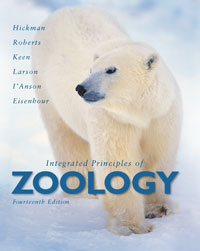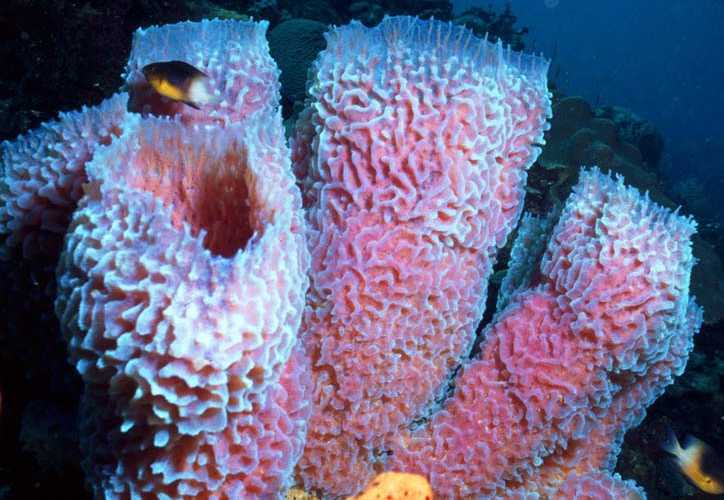1.
Multicellular;
body an aggregation of several types of cells differentiated for various
functions, some of which are organized into incipient tissues of a low
level of integration
2.
Body
with pores (ostia), canals, and chambers that form a unique system of water
currents on which sponges depend for food and oxygen
3.
Mostly
marine; all aquatic
4.
Radial
symmetry or none
5.
Outer
surface of flat pinacocytes; most interior surfaces lined with flagellated
collar cells (choanocytes) that create water currents; a gelatinous protein
matrix called mesohyl contains amebocytes of various types and skeletal
elements
6.
Skeletal
structure of fibrillar collagen (a protein) and calcareous or siliceous
crystalline spicules, often combined with variously modified collagen (spongin)
7.
No
organs or true tissues; digestion intracellular; excretion and respiration by
diffusion
8.
Reactions
to stimuli apparently local and independent in cellular sponges, but electrical
signals in syncytial glass sponges; nervous system probably absent
9.
All
adults sessile and attached to substratum
1. Asexual
reproduction by buds or gemmules and sexual reproduction by eggs and sperm;
free-swimming flagellated larvae in most
Classification
of Phylum Porifera
1.
Class Calcarea (cal-ca' re-a) (L. calcis, lime) (Calcispongiae).
Have spicules of calcium carbonate that often form a fringe around the
osculum (main water outlet); spicules needleshaped or three or four rayed; all
three types of canal systems (asconoid, syconoid, leuconoid) represented; all
marine. Examples: Sycon, Leucosolenia, Clathrina.
2.
Class Hexactinellida (hex-ak-tin-el' i-da)
(Gr. hex, six, " aktis, ray, " L. -ellus, dim. suffi x)
(Hyalospongiae). Have six-rayed, siliceous spicules extending at right
angles from a central point; spicules often united to form network; body often
cylindrical or funnel-shaped; flagellated chambers in simple syconoid or leuconoid
arrangement; habitat mostly deep water; all marine. Examples: Venus’ flower
basket (Euplectella), Hyalonema.
Figure 3. Sycon gelatinosum
Figure 4. Leucosolenia variabilis
Figure 5. Clathrina clathrus
Figure 6. Euplectella aspergillum
Figure 7. Hyalonema sp.
3.
Class Demospongiae (de-mo-spun' je-e) (Gr. demos, people,
" spongos, sponge). Have siliceous spicules that are not six rayed,
or spongin, or both; leuconoid-type canal systems; one family found in
freshwater; all others marine. Examples: Thenea, Cliona, Spongilla, Myenia,
Poterion, Callyspongia, and all bath sponges.
Figure 8. Cliona orientalis
Figure 9. Spongilla lacustris
Figure 10. Callyspongia plicifera
Figure 11. Hippospongia lachn
Figure 12. Bath sponges
Reference of data

Integrated Principles of Zoology, 14/e
Cleveland P. Hickman, Jr., Washington and Lee University
Larry S. Roberts, Texas Tech and Florida International University
Susan L. Keen, University of California,
Davis Allan Larson, Washington University
Helen I'Anson, Washington and Lee University
David J. Eisenhour, Morehead State University
Reference of picture
1. https://classconnection.s3.amazonaws.com/749/flashcards/842749/jpg/porifera-sponges1319045197404.jpg
2. https://blogger.googleusercontent.com/img/b/R29vZ2xl/AVvXsEgdaKdI2CsImhpfUwhGbJTdbJUqQvEvgnvJvi39v8Vlxd-J69avArwXIRGD8ZDnE1BEY7i7moCwExH-ZNyt2eMI9Wzu7Fw8VTaEjijeB0a-ndCyXC5dE2zXdQfMZNd8_fuF5jrlbhL4KKlC/s1600/picture21.jpg
3. Campbell Biology 10/E Reece, Urry, Cain, Wasserman, Minorsky & Jackson
4. https://blogger.googleusercontent.com/img/b/R29vZ2xl/AVvXsEhYpJ2pEs1_faDYeyMIs1r497fHXTNUJ_zsUDlR3re_DClH7UeS3KEx1lSOzlVbzdAR8Cf0yA-6yUWi1nNZVPSSmeEV9ehMMHG3b0SFeAjBf51Cn9Y0k02gTTaSppDsfswb2pBnXAysMIsb/s1600/Sycon-gelatinosum.jpg
5. http://www.cibsub.cat/rcs_gene/Leucosolenia_variabilis02.jpg
6. http://www.mer-littoral.org/02/photos-600x400/clathrina-clathrus-b19-17-600x400.jpg
7. http://www.photolib.noaa.gov/700s/expl7520.jpg
8. https://ecomar2010.files.wordpress.com/2010/06/1-small.jpg
9. http://www.senckenberg.de/files/content/presse_joerdens/cliona_orientalis_befallt_lebende_koralle.jpg
10. http://upload.wikimedia.org/wikipedia/commons/4/45/Spongilla_lacustris.jpg
10. http://bio1151b.nicerweb.com/Locked/media/ch33/33_Purple_Vase_Sponge_Callyspongia_plicifera.jpg
11. https://c1.staticflickr.com/1/94/251334244_6f19485060_z.jpg?zz=1
12. http://www.travelmagazine.org/wp-content/uploads/2011/10/rhodes401.jpg














มีแปลด้วยจะดีมาก
ตอบลบให้คนทั่วโลกอ่านไม่ใช่เฉพาะคนไทย
ลบ